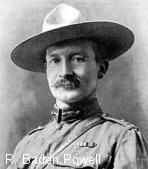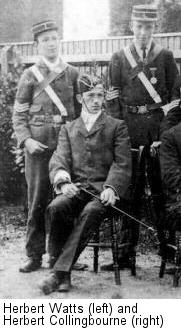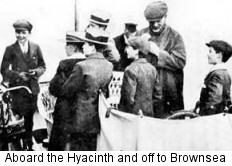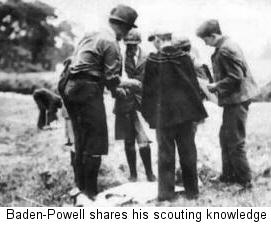|
Baden-Powell and the Winton Boys
 Seven
members of the Winton Boys Brigade played a key role in founding
the Scout movement. Seven
members of the Winton Boys Brigade played a key role in founding
the Scout movement.
In the summer of 1907, Robert Baden-Powell decided
to test the principles laid out in his book "Aids to Scouting".
It was to be a secret experiment and he chose Brownsea Island
in Poole Harbour as the location.
Around twenty boys took part - with a variety of
backgrounds and ages. Half were public school boys, three were
from Poole Boys Brigade and the remaining seven were from the
1st Bournemouth Boys Brigade, in Winton. Their ages ranged from
thirteen to seventeen and they were to take part in the first
ever Scout camp.
 Here
are the names and ages of the Winton boys. Their addresses, where
available, are taken from census data. Here
are the names and ages of the Winton boys. Their addresses, where
available, are taken from census data.
Albert Blandford (13) - 2 Wycliffe Road, Winton
Herbert Watts (17) - 32 Alma Road, Winton
James Tarrant (16) - 29 Cardigan Road, Winton
Arthur Vivian (15) - 41 Alma Road, Winton
Terence Bonfield (13)
Herbert Collingbourne (15)
Richard Grant (?)
Speaking to the Evening Echo in 1989 the late Terry
Bonfield gave this description of the experience:
"I was one of seven boys picked from the
Winton Boys Brigade. There were also three from the Poole Brigade
and 10 boys who were the sons of Baden-Powell's friends. The Bournemouth
boys were taken to Sandbanks on a lorry by Henry Robson, who had
a big grocery business at The Triangle.
We went to the island on a boat belonging to
Harvey's which I think was called the Hyacinth. The other boys
 went
in a bigger boat from Poole Quay. The boys were deliberately chosen
from different backgrounds because Baden-Powell wanted to see
how they would mix. We didn't know where we were going or what
it was all about. It was all very secret because Baden-Powell
didn't know whether it would be a success. went
in a bigger boat from Poole Quay. The boys were deliberately chosen
from different backgrounds because Baden-Powell wanted to see
how they would mix. We didn't know where we were going or what
it was all about. It was all very secret because Baden-Powell
didn't know whether it would be a success.
His idea was to bring youngsters of different
nationalities together so that they would learn one another's
customs and ways and then there would be no wars. Unfortunately,
it hasn't gone that far.
Equipment at the first camp - which went on for
more than a week - included six bell tents, a marquee and the
flag - which had flown over Mafeking. Activities included first
aid, life-saving, knot-tying, tracking, and observation skills.
In the evening, Baden-Powell told the boys Boer War stories around
the camp fire."
Here is Baden-Powell's outline programme for the
week July 29 - August 8, 1907:
- DAY 1 Preliminary - After settling into camp, formation of
patrols and distribution of duties, orders etc each subject
of the camp was explained with demonstrations. Patrol Leaders
received a special course of instruction in he field for them
to impart subsequently to their Patrols
 DAY
2 Camping -Camp resourcefulness. Hut and mat making. Knots,
Fire-lighting, cooking, health and sanitation. Endurance. Finding
way in strange country. Boat management DAY
2 Camping -Camp resourcefulness. Hut and mat making. Knots,
Fire-lighting, cooking, health and sanitation. Endurance. Finding
way in strange country. Boat management- DAY 3 Observation - Noting and memorising details near and
far. Landmarks etc. Tracking. Deducing meaning from tracks and
signs. Training eyesight, etc
- DAY 4 Woodcraft - Study of animals and birds, plants, stars,
etc, stalking animals. Noticing details of people. Reading their
character and condition, thereby gaining sympathy, etc
- DAY 5 Chivalry - Honour, code of the knights. Unselfishness.
Courage. Charity and Thrift. Loyal to King and to Employers
or Officers. Practical chivalry to women. Obligation to do a
"Good Turn" daily and how to do it
- DAY 6 Saving a Life - From fire, drowning, sewer, gas, runaway
horses, panic, street accidents etc. Improvised apparatus. First
Aid etc
- DAY 7 Patriotism - Colonial Geography. History and deeds that
won the empire. Our Navy and Army. Flags, medals. Duties as
citizens. Marksmanship. Helping Police etc.
- DAY 8 Games - Sports comprising games or competitive practices
in all subjects of the camp
The experiment was a success and Scouting spread
rapidly around the world. But it took only seven years for the
hope of ending wars to be proved futile.
Three of the Winton boys died as a result of the
First World War. Albert Blandford and Richard Grant were killed
at Flanders. Herbert Collingbourne died in 1926 from the effects
of poison gas.
Like the other Winton boys - they are not forgotten.
|